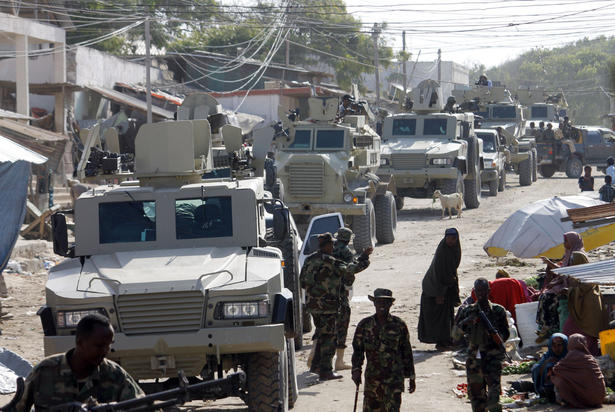
African union peacekeeping forces and Transitional Federal Government (TFG) soldiers patrol the streets of Merka, 90 kilometres north of Mogadishu, ahead of the presidential election on Sept. 10.
goj
By Michelle Shephard, National Security Reporter
Tuesday, September 04, 2012
“Historic,” “progress” and “optimism” do not seem like fitting descriptions of Somalia’s election.
Not with accusations of intimidation and corruption, the lack of required female parliamentarians and legal disputes over the political status of former warlords.
In other words, aren’t these the same Mogadishu politics that Somalis lament have operated for years on the basis of maxi igu jira (“what’s in it for me).
But with appointment last week of a new speaker of parliament and the stage set for the selection later this month of a president, Somalia’s election is indeed being hailed as a success despite the controversies.
“This is a moment of progress and optimism,” said Augustine Mahiga, the UN special representative for Somalia, in a statement following the appointment of former labour minister Mohamed Osman Jawa as speaker.
James Swan, the U.S. ambassador to Somalia, congratulated the parliament on its “historic election.” And the UN Security Council called the steps in the political process “landmark events.”
Could the world’s No. 1 failed state really be on the cusp of change?
Somalia has not had a functioning central government since 1991, when warlords overthrew Mohamed Siad Barre’s regime. Since 2004, various UN-endorsed transitional administrations have done little but erode the public’s confidence in government.
During that time Somalia has battled Al Qaeda’s proxy, Al Shabab, and lost 29,000 children to last year’s devastating famine.
But this extended political process, which will culminate with the appointment of a new president as early as next week, began last year with the drafting of Somalia’s constitution, its first in 20 years.
The constitution required the approval of six parties: the leader of a Sufi militia, the transitional government’s president, its prime minister, its parliamentary speaker and the presidents of two autonomous regions.
With their consent, the National Constituent Assembly (NCA), a group of 825 prominent Somalis, were able to pass the constitution last month.
Then traditional clan elders selected a new parliament, a process dogged by accusations of vote-buying and threats. There were also disputes over whether former warlords should be excluded and the failure of the elders to appoint the required quota of 30 per cent female parliamentarians.
But the process pressed ahead, and last Tuesday, the 228 chosen parliamentarians voted in the new speaker, ousting former interim speaker Sharif Hassan Sheikh Aden, who was repeatedly accused by the UN Monitoring Group on Somalia of stealing government funds.
The presidential vote is set for Sept. 10. This government then has four years to prepare Somalia for democratic elections.
While the international response has been largely to praise the process so far, many analysts temper that enthusiasm.
“There’s lots of arm-twisting, corruption and manipulation within the current political system … dealing with Somalia, that’s what you get,” says Afyare Elmi, a Somali-Canadian political scientist at Qatar University.
Elmi said the election could hardly be considered a watershed moment for the country but it could be an “incremental” step forward. “The fact that we now have a parliament, that’s a symbolic change.”
The front-runners for president are the current transitional government president, Sheikh Sharif Sheikh Ahmed, and Prime Minister Abdiweli Mohamed Ali.
Both were accused of corruption in the last UN report but they have support among the parliamentarians.
Also in the running is Mohamed Abdullahi Farmajo, a former Somali-American civil servant from Buffalo, who served as prime minister in 2010 before Abdiweli. When he was ousted from power in June 2010, there were protests in Mogadishu.
“It was a huge responsibility to govern an ungovernable state with a dysfunctional government … to start everything from scratch,” Farmajo said told the Star in Nairobi this summer.
Farmajo arrived while the Shabab still controlled much of Mogadishu. He had not been in Somalia for 25 years and said the culture shock was immense.
“Every morning it was the normal routine that I heard gunshots at my bathroom window.” he said. “The first day was a shock when I heard pow-pow-pow but then after that I knew the bullets could not get through.”
Farmajo, whose nickname comes from his father’s love of cheese, was credited with cleaning up much of the government corruption and ensuring Somalia’s soldiers were fed and paid. In August 2011, the Shabab withdrew from the capital and retreated to strongholds in the south.
While Farmajo is widely popular, he does not appear to have the parliamentarian support needed to be selected president.
“Farmajo is a public favourite,” said Elmi. “But since he was not one of the incumbents that manipulated the process, it is unlikely that he would get the support of the majority of the MPs.”
As the election process continues, Kenyan, Ugandan and Burundi forces fighting alongside Somalia’s army continue to make gains on the Shabab, moving closer to the port city Kismayo.
Source: Toronto Star